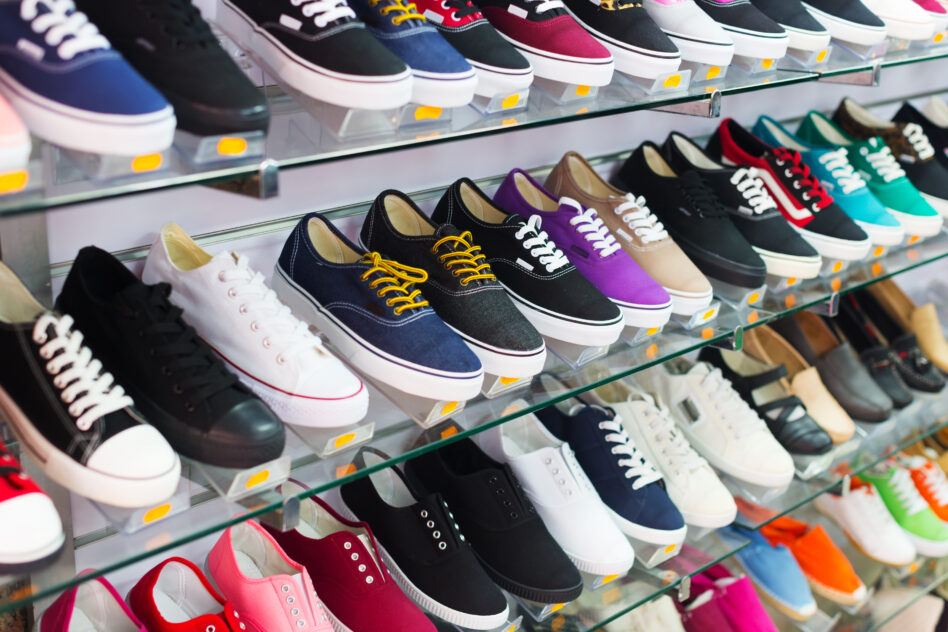
It seems that footwear brands are making a trendy return to wholesale channels as a major means of distribution.
Direct-to-consumer (DTC) sales exploded in popularity in recent years, thanks to websites like Amazon and Sports Direct. They cut out wholesale middlemen altogether with the promise of higher savings and direct communication with customers.
Many major brands such as Nike, Adidas, Under Armour, and many more, all started to favour selling their merchandise through their website stores in favour of retail outlets. In recent years, newer labels have skipped on retail stores completely and sell solely through online means.
Cutting out the middleman comes with its own set of drawbacks though, and it seems that companies are starting to realize and make changes accordingly. Take California-based sneakers Allbirds and the Swiss sneaker company On, for example. Both companies started with different strategies for their distribution channels. Allbirds started by only selling their footwear at select retailers such as Nordstrom and Dick’s Sporting Goods, which accounted for about only 5% of their revenue sales. On the other hand, On went a different route and worked closely with third-party retailers. As a result, this business strategy accounted for more than 65% of its overall sales.
Factory shutdowns in Vietnam in 2021 resulted in stock shortages. To combat this, On elected to put its shoes on retailers’ shelves instead of its own online storefront. This put the Swiss shoe brand in the good graces of retailers who were being deprived of stock from industry leaders such as Nike and Adidas. This wholesale tactic paid off for On, who have enjoyed increased sales growth and bottom-line profits in the past three quarters.
Allbirds on the other hand has yet to see a net profit. According to the sales figures for this quarter put forth by Wall Street estimates, Allbirds has enjoyed an annual growth margin of roughly 17% since 2019, while On’s profits skyrocketed by a rate of 66%. Financial experts have cited wholesalers’ ability to reach customers quickly on a larger scale and the channel’s face-to-face connection with customers as the two main reasons for the avenue’s continued success.
These particular aspects are something companies like Nike are still trying to figure out. While Nike hasn’t officially acknowledged a turn away from its DTC priorities, the shoe giant does appear to be slowly returning to the retail space. For the first time in more than three years, Nike has invited wholesale entities back onto its campus, and although Nike planned to reduce stock to outlets such as Foot Locker, it seems that this has not been the case, at least not yet.
It looks as though giants such as Nike might still need retailers more than what was first forecast back in 2020. Even with Nike’s over 1,000 stores worldwide, this is only around 35% of stores like Foot Locker’s global reach.
Although the Covid-19 pandemic initially crippled the retail business, customers are now returning in droves to conventional shopping outlets such as retail and chain stores. Branches like Foot Locker, Dick’s Sporting Goods, and many others, have all reported increases in their in-store sales in 2022, with this growth estimated to continue going forward.
Although Direct-To-Consumer selling was the trend for a while, it looks as though might have been just that, “a trend”. It seems like wholesale remains shoppers preferred method for shopping and that isn’t going to change anytime soon.

It seems that footwear brands are making a trendy return to wholesale channels as a major means of distribution.
Direct-to-consumer (DTC) sales exploded in popularity in recent years, thanks to websites like Amazon and Sports Direct. They cut out wholesale middlemen altogether with the promise of higher savings and direct communication with customers.
Many major brands such as Nike, Adidas, Under Armour, and many more, all started to favour selling their merchandise through their website stores in favour of retail outlets. In recent years, newer labels have skipped on retail stores completely and sell solely through online means.
Cutting out the middleman comes with its own set of drawbacks though, and it seems that companies are starting to realize and make changes accordingly. Take California-based sneakers Allbirds and the Swiss sneaker company On, for example. Both companies started with different strategies for their distribution channels. Allbirds started by only selling their footwear at select retailers such as Nordstrom and Dick’s Sporting Goods, which accounted for about only 5% of their revenue sales. On the other hand, On went a different route and worked closely with third-party retailers. As a result, this business strategy accounted for more than 65% of its overall sales.
Factory shutdowns in Vietnam in 2021 resulted in stock shortages. To combat this, On elected to put its shoes on retailers’ shelves instead of its own online storefront. This put the Swiss shoe brand in the good graces of retailers who were being deprived of stock from industry leaders such as Nike and Adidas. This wholesale tactic paid off for On, who have enjoyed increased sales growth and bottom-line profits in the past three quarters.
Allbirds on the other hand has yet to see a net profit. According to the sales figures for this quarter put forth by Wall Street estimates, Allbirds has enjoyed an annual growth margin of roughly 17% since 2019, while On’s profits skyrocketed by a rate of 66%. Financial experts have cited wholesalers’ ability to reach customers quickly on a larger scale and the channel’s face-to-face connection with customers as the two main reasons for the avenue’s continued success.
These particular aspects are something companies like Nike are still trying to figure out. While Nike hasn’t officially acknowledged a turn away from its DTC priorities, the shoe giant does appear to be slowly returning to the retail space. For the first time in more than three years, Nike has invited wholesale entities back onto its campus, and although Nike planned to reduce stock to outlets such as Foot Locker, it seems that this has not been the case, at least not yet.
It looks as though giants such as Nike might still need retailers more than what was first forecast back in 2020. Even with Nike’s over 1,000 stores worldwide, this is only around 35% of stores like Foot Locker’s global reach.
Although the Covid-19 pandemic initially crippled the retail business, customers are now returning in droves to conventional shopping outlets such as retail and chain stores. Branches like Foot Locker, Dick’s Sporting Goods, and many others, have all reported increases in their in-store sales in 2022, with this growth estimated to continue going forward.
Although Direct-To-Consumer selling was the trend for a while, it looks as though might have been just that, “a trend”. It seems like wholesale remains shoppers preferred method for shopping and that isn’t going to change anytime soon.



